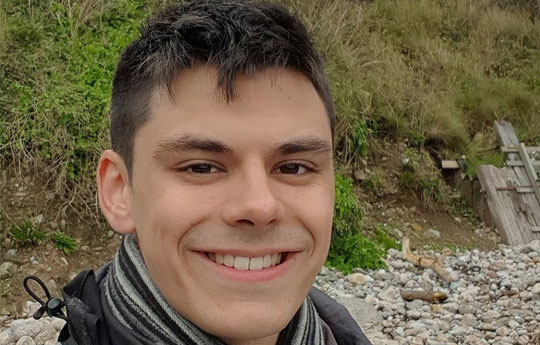
Sean Holm
- Country:
- United Kingdom
- Course:
- PhD Medical and Health Care Studies
What did you do prior to completing your PhD?
My journey in higher education started with an undergraduate degree in biochemistry at Swansea University, where I developed key lab skills and honed my understanding of the biochemical processes that govern our biological world.
What is your research topic?
I am an immunologist meaning I study the immune system. In particular, I focus on immune responses in pregnancy and very early life.
Why did you decide to complete a PhD?
A most enjoyable aspect of my undergraduate studies were opportunities to independently research topics which initially lead me to consider a future career in research. Between second and third year I completed a placement with the Thornton lab group, where I gained a real appreciation of lab based research and followed this up with by taking my dissertation project with the same group. I thoroughly enjoyed working under Dr Nick Jones, investigating glutamine metabolism in early T cell responses and decided a future career in research was definitely something I wanted to pursue.
Why did you decide to study at Swansea University?
I had a very positive experience during my undergraduate studies here.
Secondly, the group I was working with was exciting to be a part of. The work I did with them during my dissertation was even published as part of a paper in Nature Communications.
Finally, Swansea University Medical school was highly rated by the research excellence framework which made it a highly attractive place to study.
What challenges have you faced?
Post graduate research is filled with all sorts of challenges some are foreseeable whilst others are completely unpredictable, but a research degree is essentially a degree in problem solving so it’s all just par for the course. Research can be incredibly demanding on your time, so maintaining a work life balance can be difficult. However, undoubtedly the greatest challenge I faced was the impact of COVID. The ensuing challenges forced me to make many changes to the approaches I was taking but also spurred growth and development in new areas such as teaching myself how to code.
What have you gained from undertaking your PhD?
There are whole host of skills I have gained from doing a PhD. Including…
- Devise repertoire of lab techniques.
- Being able to write and present for a diverse group of audiences.
- How to build networks and collaborate with people from all over the world.
- Time management and project planning.
The more opportunities you take alongside your studies the more skills you will learn and develop.
How will your qualification help your career? Has it already helped your career?
A PhD is an excellent springboard into a life sciences career. The lab based and writing skills developed during a PhD are highly sort after by life sciences employers and absolutely essential for an academic career. Furthermore, the wide range of soft skills I have developed over the course of my PhD are transferable to a wide range of jobs.
What’s been your highlight?
I definitely got a little dopamine rush every time I made a small breakthrough, found the solution to a problem I had been stuck on or found something new and interesting in my results.
But the real highlight for me has been attending conferences and presenting my research to a group of like-minded individuals and discussing the horizons of research to come.
What advice would you give to students considering postgraduate study?
Firstly, I would advise them to be really sure of the topic and the group they want to work with has these factors will hugely impact on your PGR experience.
I would also recommend getting involved in as many things as possible during your studies. Attend conferences; present in the three-minute thesis; get involved in teaching and outreach.
